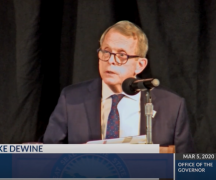An ugly campaign for a taxpayer-funded corporate bailout was itself funded by an even uglier criminal conspiracy, federal law enforcement officials said Tuesday.
Ohio House Speaker Larry Householder, four political operatives and a dark-money group were charged Tuesday in a criminal complaint that an Ohio energy company paid them $61 million to get a $1.3 billion nuclear bailout from taxpayers.
Charged along with Householder were Matt Borges, a lobbyist who was formerly chairman of the Ohio Republican Party, Neil Clark, a lobbyist who owns Grant Street Consulting, Juan Cespedes, also a lobbyist, and Householder’s aide, Jeffrey Longstreth.
All are charged with racketeering, which carries a prison sentence of up to 20 years.
The alleged conspiracy, which revolved around the bailout of two failing nuclear plants in Northern Ohio, is “likely the largest bribery and money-laundering scheme ever in the state of Ohio,” David M. DeVillers, U.S. Attorney for the Southern District of Ohio, said at a Tuesday afternoon press conference.
Shortly after the press conference, Ohio Gov. Mike DeWine called on Householder, his fellow Republican, to step down.
“I am deeply concerned about the allegations of wrongdoing in the criminal complaint issued today by the U.S. Attorney’s Office,” DeWine, who signed the bailout bill almost a year ago to the day, said in a written statement. “Every American has the presumption of innocence until proven guilty. Because of the nature of these charges, it will be impossible for Speaker Householder to effectively lead the Ohio House of Representatives; therefore, I am calling on Speaker Householder to resign immediately. This is a sad day for Ohio.”
The criminal complaint says that “Company A,” the former FirstEnergy Solutions of Akron, worked to save its failing nuclear plants by funneling $61 million into Generation Now, a 501(c)(4) “dark money” group controlled by Householder.
“Make no mistake, this is Larry Householder’s 501(c)(4),” the U.S. attorney said.
The money was used for three general purposes, the complaint said. First it was used to build “Team Householder” through campaign contributions and other measures that helped Householder win the speakership in 2019.
That was a heavy lift. The criminal complaint noted that Householder was competing for the House’s top spot against Rep. Ryan Smith, R-Bidwell, who had been appointed to the post in mid-2018. By using funds contributed by FirstEnergy to Householder’s dark money “social welfare” group, Householder was able provide advertising and staff for supportive candidates in the 2018 primary and in the general election, the complaint said.
“In exchange for payment from Company A, Householder’s enterprise helped pass House Bill 6, legislation described by an enterprise member as a billion-dollar ‘bailout’ that saved from closure two failing nuclear power plants in Ohio affiliated with company A,” the complaint said.
The money was also used for the personal benefit of Householder and the other conspirators, DeVillers said. Householder got about $500,000, he said. Of that, he used $20,000 to pay off credit card debt, $100,000 for repairs to a house he owns in Florida and another amount was used to settle a civil lawsuit against Householder.
And the money was used to fend off a petition effort to repeal HB 6, going so far as to buy plane tickets for and pay $2,500 each to people circulating it to get out of town, DeVillers said. All told, FirstEnergy put up $38 million for that purpose, the criminal complaint said. In addition to buying TV time and sending campaign mailers, members of Householder’s “enterprise” used the money to lock businesses that gather signatures out of the campaign, and they attempted to bribe people working on the petition drive to provide inside information, the complaint said.
DeVillers said “I don’t see how (the conspiracy) could possibly have happened” if not for the misuse of the dark money group which, unlike political action committees, doesn’t have to disclose its donors. Such 501(c)(4) groups are supposed to be for “social welfare,” but the only uses to which the 81-page criminal complaint said it was put to were building Householder’s power base, passing HB 6 and enriching members of the enterprise.
“Not one dime went to any social program,” DeVillers said.
Also, despite corporate claims of poverty FirstEnergy in May announced a $300 million buyback of its stock — a move calculated to increase the value of company shares that executives of have in abundance.
The complaint alleges close cooperation between Householder’s team and FirstEnergy executives, alleging that Householder flew in their corporate jet, frequent calls between the groups. In one instance, a senior executive for FirstEnergy asked to go into the field to see efforts to gather petition signatures, the complaint said.
FirstEnergy, its leaders and its spun-off companies were not charged Tuesday. The company’s stock price fell 17% Tuesday, to $354.25 a share.
DeVillers it was crucial to keep the investigation secret until Tuesday. Now it begins a new phase that might be causing some lawmakers, energy executives and some others to lose sleep.
“We are not done with this case,” he said. “There were things we couldn’t do before. People we couldn’t interview. People we couldn’t subpoena. Documents and search warrants we couldn’t execute.
“As of this morning there are a lot of FBI agents knocking on a lot of doors asking a lot of questions, serving lots of subpoenas. That’s going to go on for days.”
House Bill 6 is adding $1.3 billion in additional taxpayer bailouts to the $10.2 billion that Akron-based FirstEnergy Solutions and its former parent company, FirstEnergy Corp, have received from taxpayers since 1999. Most of the funds have gone to prop up the Davis-Besse and Perry nuclear power plants in Northern Ohio.
The company that owns the plants was renamed Energy Harbor after emerging from bankruptcy earlier this year.
Despite the companies claims of poverty, the interests behind the bailout spent millions — much of it in the form of hard-to-trace dark money on campaign contributions, a xenophobic ad campaign and then on an aggressive effort to stymie a petition drive to repeal the bailout DeWine signed into law a year ago.
The speaker election in which FirstEnergy is alleged to have invested so heavily split the Republican Party for a time. Householder ended up winning the support of 26 Republicans and 26 Democrats. His opponent, Smith, got the votes of 34 Republicans and 12 Democrats.
The Ohio Republican Party didn’t respond Tuesday to requests for comment.
The Ohio Democratic Party didn’t respond when asked about the fact that Householder wouldn’t have won the speakership without Democratic votes. However, the party chairman, David Pepper, called on Householder to step down as speaker.
“As the U.S. attorney indicated, this investigation is ongoing, and we will wait to hear all the facts as they emerge. However, given what was revealed in today’s complaint and the taint of corruption over Ohio legislative activity, we believe Speaker Householder should step down from leadership immediately as he avails himself of his due process rights,” Pepper said in a written statement.
The complaint shows that the FBI began its investigation by at least May 28, 2019, when a lawmaker reported that Householder and his team were behaving suspiciously. DeWine didn’t sign the bill until July 23, but law enforcement officials didn’t warn him off. On Tuesday they said they couldn’t reveal the existence of the investigation until then.
Asked Tuesday night if DeWine would call for the bill’s repeal in light of Tuesday’s developments, Press Secretary Dan Tierney said the governor had no more comment on the matter until Wednesday.
This isn’t Householder’s first encounter with federal law enforcement.
In 2006, the Justice Department told the FBI that it wouldn’t pursue charges against Householder. The FBI had been told two years earlier that Householder had used his post as head of the House Republican Campaign Committee to overpay some vendors in exchange for kickbacks from them.
Nor is Householder, 61, of Glenford, the first Ohio House speaker to find himself in the FBI’s crosshairs. In 2018, Speaker Cliff Rosenberger, a Republican, resigned amid an FBI probe of his overseas travel. He has not been charged, but the investigation remains open.





